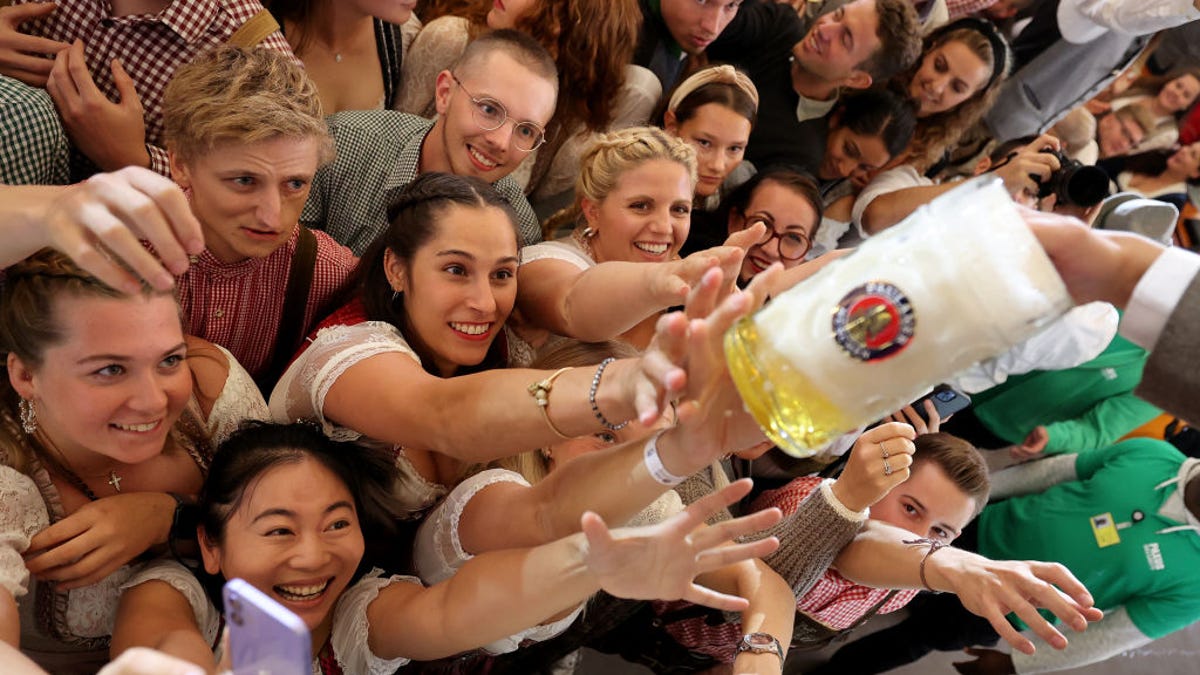Oktoberfest: Everything You Need to Know About the Bavarian Folk Festival
There's a lot more to Oktoberfest than beer. But there's plenty of that, too.
Oktoberfest is back! After a two-year pandemic pause, the world's largest folk festival kicked off in Munich on Sept. 17 with a 12-gun salute, followed by Lord Mayor Dieter Reiter tapping the first beer barrel at the Theresienwiese fairgrounds.
The 16-day festival is expected to draw over six million visitors before it concludes on Oct. 3.
While Oktoberfest is historically linked to Bavaria and southeast Germany, it's been adopted by communities all over the world. Read on to learn about Oktoberfest traditions and how you can celebrate in your town. Prost!
Need help getting into the Oktoberfest spirit? Read about the best German sausages to order online and the top beer-of-the-mont clubs.
When Is Oktoberfest?
Munich's Oktoberfest originally took place in the 16-day run-up to the first Sunday in October. With the reunification of Germany in 1994, that schedule was tweaked: If the first Sunday falls on Oct. 1 or 2, the festival is extended until German Unity Day, Oct. 3.
This year, Oktoberfest runs from Sept. 17 to Oct 3, 2022.
How is Oktoberfest celebrated?
Folk dancing, crafts, amusement park rides and live music are all part of Oktoberfest.
Beer, of course, is a big part of Oktoberfest -- In 2019, nearly 2 million gallons of beer were consumed -- and Munich's six original breweries get much of the spotlight. But there's also food, folk dancing, concerts, crafts, amusement rides, carnival games, the procession of Wiesn innkeepers and Bavarians and tourists alike parading around in dirndls and lederhosen.
While Oktoberfest is most associated with Munich and the Bavarian region, it is celebrated throughout the world, especially in regions with robust German communities.
How did Oktoberfest start?
A 19th-century lithograph of the presentation of horses at the first Munich Oktoberfest in 1810.
The celebration dates back to the wedding of Prince Ludwig of Bavaria and Princess Therese of Saxe-Hildburghausen on Oct. 12, 1810. Munich's residents were invited to celebrate the royal nuptials in front of the city gates on fields renamed Theresienwiese ("Theresa's Meadow") in honor of the new bride. In addition to ample food and libation, horse races were incorporated into the festivities.
The celebration was repeated in 1811, starting the annual Oktoberfest tradition. A parade has been an important component of the Oktoberfest since 1850: Some 8,000 people in traditional Bavarian clothing walk through the center of Munich to the fairgrounds, under the banner of the Münchner Kindl ("Munich child"), the symbol on the city's coat of arms.
Oktoberfest has been canceled at least 26 times -- including during the Napoleonic Wars, World War I and World War II, and most recently during the height of the COVID-19 pandemic.
Oktoberfest celebrations and promotions around the world
Can't get to Munich? Learn about Oktoberfest celebrations across the US at our sister site The Points Guy.
In addition, Snyder's of Hanover pretzels has launched a new Oktoberfest-inspired flavor, Snyderfest Beer Cheese Pretzel Pieces.
You can pick up 10-ounce bags of Snyderfest Beer Cheese Pretzel Pieces for $4.79 at major retailers like Walmart and Kroger.


